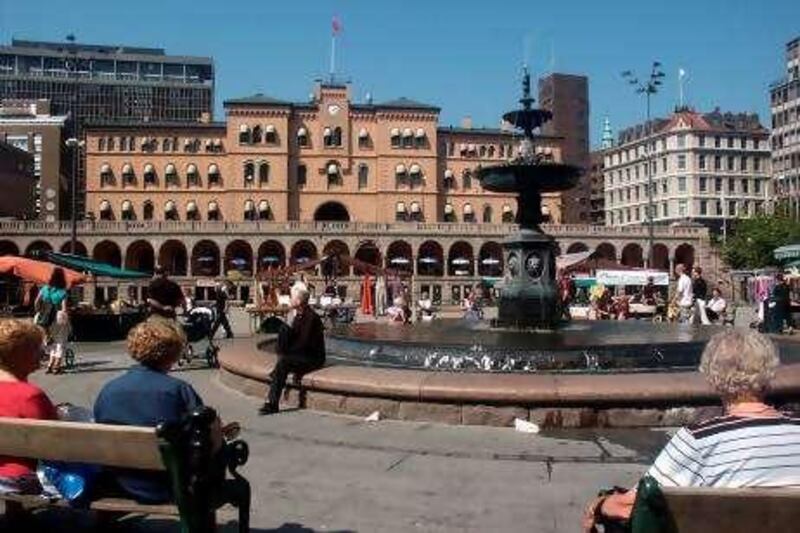The only major complaint tourists have after visiting Norway is that it's expensive. "How can the Norwegians afford it?" many baffled visitors ask. The first reason is the locals mostly do their eating and drinking at home. The second is that they earn a lot more money than, say, the British or Americans. While the average full-time US income is US$39,336 (Dh144,485) a year, in Norway it is a whopping $67,543.
Norwegians do fret about the recession, but it is hard to get too worried when your government is running a surplus worth 10 per cent of GDP, against a deficit of more than 10 per cent in the US and 13 per cent in the UK. With a strong currency and AAA credit rating, social democratic Norway is the land recession forgot. So where did it all go right? Half a century ago, the country was a poor European backwater, but in 1969 it discovered its first North Sea oil field and everything changed.
Its energy sector is now worth almost one quarter of the total GDP, generates nearly one third of all government revenue and makes up 50 per cent of the country's exports. In a population of just under 5 million, the money goes a long way. Norway also has plentiful gas supplies, and exports the lot, using hydroelectric power to heat and light its own homes. To their surprise and mild shame, Norwegians have suddenly found that they are highly prosperous. The country's total GDP recently outstripped that of Sweden, which has double the population.
No wonder the country's Scandinavian neighbours refer to Norwegians as "sheikhs on skis". Unlike many countries, Norway has saved rather than squandered its black gold bonanza, says Kyrre Aamda, the chief economist at the Norwegian bank DnB Nor. "The government has a big stake in Norwegian oil companies, owning around two thirds of oil giant Statoil, and taxes oil revenues at a high marginal rate of 78 per cent. This brings a lot of money in, but we are spending as little of it as possible." Norway invests its surplus oil revenues in a sovereign wealth fund that has grown to become the second-largest pension fund in the world, worth about $440 billion.
"If we spent the oil fund, Norway would become even more expensive and nobody would buy our exports. We are saving it instead, to meet welfare and pension payments after the oil runs out." Unlike neighbouring Iceland, Norway wisely avoided the excesses of the financial services splurge. "We had a banking crisis in the 1990s. Many of our senior bankers went through that, and this stopped them from getting too carried away during the boom years," Mr Aamda says.
The country's large state sector has also helped to see it through the financial crisis. The state employs more than 30 per cent of the workforce, and when private employment fell at the start of the credit crunch, public sector recruitment rose to plug the gap. Just 2.2 per cent of Norwegians were unemployed in May, up from 2.1 per cent a year earlier, compared with the EU average of 10 per cent. No wonder Swedes are flocking to work in Oslo's cafes, shops and restaurants. Property prices have shot up in recent years, but remain affordable. Eight out of 10 Norwegians own their homes, compared with just 50 per cent in Denmark and Sweden, says Rolf Mæhle, deputy director of the trade organisation Finance Norway.
"High employment levels, low interest rates, tax relief on mortgage interest, and the fact that only a small proportion of our population live in cities have kept property affordable. Oslo is our largest city with a population of just 545,000; most people are spread throughout the countryside." More than half of the population own or have access to a cabin in the mountains or by the sea, where they can indulge their love of fresh air and nature (even if most cabins are wired up with under-floor heating and satellite TV these days).
Prosperity is slowly changing the Norwegian mentality, says Roald Fischer, who works in Oslo's financial district. "Flashing your money around has always been disliked in Norway, but that has changed slightly in recent years. People aren't so ashamed of being well off anymore." The government is battling to prevent the gap between rich and poor widening, as is the case in many Western countries.
"We have one of the lowest differences between high and low salaries in the world. The government has a big stake in many large companies, and stops them from paying senior executives too much. If you want to earn a really big salary, you have to emigrate." The government interferes in the boardroom to a degree that would be unacceptable in most countries. It recently introduced a law insisting that 40 per cent of company directors are female, and threatened to close down companies that didn't comply.
"Norwegians like to joke that we are the last socialist nation on earth, except we're not really joking," Mr Fischer says. Norwegian mothers enjoy the best statutory maternity benefits in the world. Women can take 12 months off work at 80 per cent pay, or 10 months on full pay. Fathers also enjoy generous paternity leave benefits. Norwegians might be happy to rely on the state, but they like to be independent from everybody else, regularly voting to stay out of the EU and euro. This go-it-alone attitude has hardened since the eurozone sovereign default crisis. There is one cloud hanging over the glittering Norwegian fjords. Oil production is set to peak, Mr Aamda says.
"We only have 10 years at today's production levels, followed by another 25 years of diminishing production, although we still have gas reserves for another 100 years." There is a heated debate over what to do when the oil runs out. Norway has a highly educated population, but its high costs deter foreign investment, and its oil wealth and heavy state regulation inhibits home-grown entrepreneurship.
"There is no strategy for life after oil," he says. "It would be very difficult to pick industrial winners to invest in. Our main plan is not to spend all the revenue. The decline in oil revenues will be slow, and that should give us enough time to adjust." @Email:pf@thenational.ae






